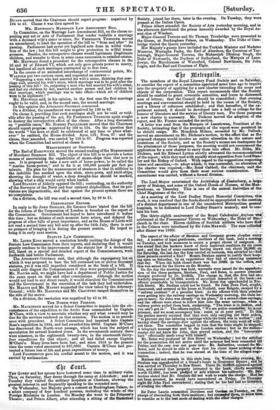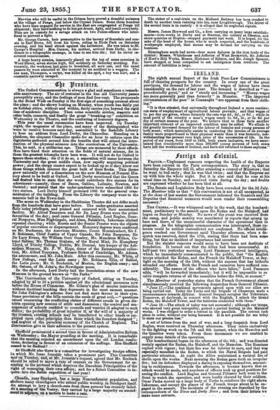t 3/ittrupilis.
The members of the Royal Literary Fund Society met on Saturday,, to consider the report of it.00mmittee.appointed -some time ago to inquire into the propriety of applying for a new charter extending the scope and. objects of the corporation. This report recommends that the Society should be enabled to grant revocable annuities, and loans to distressed: men of letters; that the Council should be remodelled; that evening, meetings and conversazioni should be held in the 'rooms of the Society, and a library of reference established ; and that hereafter, if the ex- periment succeed, it should be developed into a hail or college for the honour of literature and the service of literary men. For these purposes' a new charter is necessary. Mr. Dickens moved the adoption of the report, and Mr. Forster seconded the motion. A letter was read from the Marquis of Lsmelowne,. President of the Society, intimating that if the proposals of the report were persisted 'in he-ehould resign. Mr. Monckton Mikes, seconded by Mr. Pollocke moved an amendment on Mr. Dickens's motion, tothe effect that as the proposed changes would involve an entire alteration in the nature and • intentions of the Society, and as the Society's means are inadequate for • the attainment of those purposes, the meeting would not recommend the application for a new charter to carry them into effect. Mr. Dilke, Dickens, and Sir Edward Lytton stoutly advocated the recommendationit of the report ; while they met with equally stout opposition from Lord Stanei ley and the Bishop of Oxford. With regard to the suggestions respecting.: loans and annuities,—to adopt which, it was contended, no alteration off the charter was required,—Mr. Bond Cabbell, the chairman, said the Committee would give them their most serious consideration. The amendment was carried, without a formal division.
The Lord Mayor entertained the Archbishop .of Canterbury, ..11 bum party of Bishops, and some of the Oxford Heads of Houses, at ihe Man-:. sionhonse, on Thursday. This is one of the annual festivities of the:- Chief Magistrate of the city.
At a meeting of the Lord Dudley Stuart Memorial Committee,- thin week, it was resolved that the funds should be appropriated to the erection::: of a distinct department in one of the unendowed Metropolitan genere/ hospitals, to be dedicated to Lord Dudley Stuart's memory, and to cons' tain his bust.
The thirty-eighth anniversary of the Royal Caledoisitin ,Asylum wiaC, celebrated at the Freemasons' Tavern on Wednesday ; the Duke of Bucet clench in the chair. Eleven children of Scottish soldiers who have die in the Crimea were introduced by Sir John Maxwell. The sum collecte4' after dinner was 1500/.
The aspect of the affairs of Strahan- and Company grows cloudier every! day. A number of legal gentlemen, creditors of the bank, held a meeftfts on.Tuesday, and took measures to secure a proper choice of assignees.
was stated that the bankers knew of their insolvent condition for six _yea* past ; and the fact of some customers having drawn out about 20,0001. on the Saturday, the last day the firm carried on business, was adverted to—hie these persons received a' hint? Meseri.Strahan appear to justify their keep ing open on Saturday, by an expecMtion they had of receiving assistance' that day. When the bank closed there was but 20001. in the coffers, and: this wag seized for the Crown on the Monday.
On the day the meeting was held, warrants were issued for the appreheneS lion of the three partners, Strahan, Paul, and Bates, to answer criminal charges preferred by Dr. Griffith. The charge is, that the firm had trot lawfully disposed of 22,0001. worth of securities deposited at the bank—an offence punishable by transportation. Mr. Bates was apprehended in Nor- folk Street. Mr. Strahan could not be found. Sir John Dean Paul, sought,;-: discovered, and arrested at his house at Nutfield, near Reigate, escaped by a' "railway accident" of a peculiar kind. As the officers with their prisoner were getting into the railway carriage on Wednesday morning, the train be-: gar to move. Sir John was already "in hisplam," in a second-class carriage,:.
i
and the officers were about to follow him into the same carriage, when a: railway porter pulled them back, exclaiming,- "The train is in motion, .and; you can officers 't get in." The ors replied, " We are police-constables : he now:, prisoner, and we must accompany him : resist us at your peril." To this., the porters merely rejoined that they were only carrying out their orders„ " to prevent any one entering a carriage while the train was in motion" ; and- having closed the carriage-door against the officers, the train went off with.--Z out them. The constables begged in vain that the train might be stoppeV A telegraph message was sent to the London station ; but as the station,' master did not know Sir John,. that proved useless, and the "honourable hart" effectually made away with himself.
Mr. Bates was produced at Bow Street on Wednesday ; but the solicitor for the prosecution did not arrive until the prisoner had been remanded till •
Ridgy, and the case was not gone;intfe, • Me. counsel for Mr.; Bates, said he should be able to show that his client knew nothing of !het-, transaction ; indeed, that he was--abroad at the time of the allegednego- tiation.
Matters did not remain in this state long. On Wednesday evening, Mr. Strahan was apprehended at a friend's house in Grosvenor Square ; and he was carried on Thursday to Bow Street. There Dr. Griffith appeared against' him, and showed that property intrusted to the bank, chiefly securities;1 worth 22,0001., has been pledged or sold without his authority. Mr. Bal-1 lantine stated that Mr. Straban did not wish to evade the charge. Had he; not been arrested, he would have surrendered on Friday. On Thursday night Sir John Paul surrendered; stating that he too had had no intention of evading the officers.
Sir Peter Laurie committed Davidson and Gordon on Tuesday, on the charge of absconding from their creditors ; but remanded them, to allow time to consider as to the best mode of dealing with the other charges.
Navvies who will be useful in the Crimea have proved a dreadful nuisance at the village of Penge, just below the Crystal Palace. Some three hundred who have been engaged for service in the East are congregated at Penge till shipment; they have nothing to do but get drunk, fight, and insult everybody. Nine are in custody for a savage attack on two Police-officers who inter- fered to prevent a fight. Mr. George Curzon, heir presumptive to the barony of Scarsdale and cou- sin to Earl Howe, fell from his horse, riding in Hyde Park on Saturday evening, and his head struck against the kerbetone. He was taken to St. George's Hospital : Mrs. Curzon, his mother, arrived from Derby, in obe- dience to a telegraphic message, in time to nee him die; but he never re- covered consciousness.
A large heavy cornice, insecurely placed on the top of some premises in Wood Street, seven stories high, fell suddenly on Saturday morning. For- tunately, the workmen had gone to breakfast, all save one, and the usual passers-by were attracted at the moment by an accident to a waggon. The one man, Thompson, a carter, was killed on the spot, a boy was hurt, and a constable narrowly escaped.



































 Previous page
Previous page